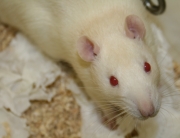Source: grist.org By Tom Laskawy
OK, another deep breath. I know what you’re thinking. You’re thinking, “Tom, didn’t we settle this issue already?” After all, as the “plant science” industry group CropLife — you know, the one that hates First Lady Michelle Obama — likes to say, “more than 150 scientific studies have been done on animals fed biotech crops and to date, there is no scientific evidence of any detrimental impact.”
You’ll remember, I’m sure, the recent brouhaha over a French study by scientist Gilles-Eric Séralini that purported to find evidence that a GMO-based diet caused tumors in rats. Critics immediately raised significant questions about that study and the consensus quickly became that it was poorly conceived and executed. It was also the study that caused several science writers to conclude that anti-GMO sentiment was the moral equivalent of climate denial. Good times.
So is this new study [PDF], as the critics are already asserting, “L’affaire Seralini” redux? Let’s take a look.
Australian scientists, working with an Iowa farmer and U.S. veterinarians, studied 168 “commercial” piglets as they were raised and fattened for slaughter. Half of the pigs received non-GMO feed and another half ate feed made from GMO corn and soy. Researchers made sure that the GMO feed contained multiple kinds of genetically modified grains that are common in livestock feed; one grain was raised from seed that is herbicide-tolerant, for example, and another from seed that expresses its own pesticide. (One of the complaints of past GMO feeding trials is that they did not reflect actual feeding practices and thus couldn’t account for any potential “synergy” from exposing animals to more than one of these so-called “transgenes.”)
The vets who examined the pigs post-mortem didn’t know whether they were looking at an animal raised on GMO feed or not — to preserve the “blind” nature of the study.
The results, as reported by Reuters:
Researchers said there were no differences seen between pigs fed the GM and non-GM diets for feed intake, weight gain, mortality, and routine blood biochemistry measurements.
But those pigs that ate the GM diet had a higher rate of severe stomach inflammation — 32 percent of GM-fed pigs compared to 12 percent of non-GM-fed pigs. The inflammation was worse in GM-fed males compared to non-GM fed males by a factor of 4.0, and GM-fed females compared to non-GM-fed females by a factor of 2.2. As well, GM-fed pigs had uteri that were 25 percent heavier than non-GM fed pigs, the study said.
So what are we to make of this?
Some critics, like crop scientist Anastasia Bodnar, co-director of the nonprofit group Biology Fortified, take serious issue with a lack of attention to ensuring the feeds were truly equivalent except for their GMO status. As she told me via email, “ideally, a feeding study like this would have controlled growing environments, genetic isolines, and component testing” so that researchers could isolate any effects they may have found. This study did not.
And there are legitimate questions about how the researchers analyzed the data they collected. While it’s true that researchers did find “statistically significant” differences in the incidence of “severe” stomach inflammation among the GMO- and non-GMO-fed animals, they didn’t use the ideal techniques that can help identify the possibility that the findings were the result of random chance. One scientist, an agronomist and statistician who is often critical of anti-GMO studies,observed in a blog post that different, potentially more defensible statistical techniques would have found no differences between the animals.
Nonetheless, even critics of the study agree that it was conducted in a rigorous way, and the findings are intriguing and worth pursuing. The researchers did, after all, find high rates of severe inflammation. As the study’s main author, Judy Carman, observed in a response to critics, all commercial pigs raised in typical hog barn conditions experience gut inflammation to a degree. The point is that the severity was much worse for GMO-fed pigs.
But instead of calling for independent, rigorous science to explore the questions the study raised, critics dismiss it as “junk science,” biased by Carman, who is a professor at Flinders University in South Australia but has produced commentary critical of GMOs. They also point out that that the farmer involved in the study is a provider of GMO-free feed. This, despite the fact that this study was funded by the Australian government, not an advocacy group (or the biotech industry, for that mater). The takeaway for scientists who might be interested in studying the effects of eating GMO crops is that it’s not worth the trouble.
I’ve written about this effect in the past and I should add that research produced by the companies that make these products, which represents almost all of the research done on GMOs, does not prompt the same response. In fact, government agencies use this science when deciding whether it’s OK for companies to put these products in our food.
In the wake of the Seralini backlash, François Houllier, the head of France’s agricultural research agency, took to the pages of the journalNature and endorsed more research on GMOs, not less. He said:
I believe that we need to publicly fund more risk–benefit analyses of GM crops. We also need more interdisciplinary studies of GM foods, especially on health impacts in animals and humans …
Second, research must always follow proper academic standards. In my opinion, any breach in the rigour and traceability of the scientific workflow … could, I fear, lead to a lack of trust … The more unexpected the results, the more rigorous this workflow should be…
As scientists, we must champion the multiple concerns of society, even when they make a contradictory call for more innovation as well as more precaution.
These are not the words of someone who has dismissed out of hand the very possibility that GMOs might produce unknown harms. It’s not as if harmful effects from industrial products are always immediately understood (see: DDT, BPA, PCBs, etc., etc., etc.). We now have an entirely new field called epigenetics that is just beginning to explore how substances we are exposed to may affect us. And then there’s the notion of our microbiome, which opens an entirely new frontier for research.
Critics of GMOs are accused of letting ideology trump science. But watching the scathing, knee-jerk reactions to any new piece of research that shines a less-than-positive light on GMOs, it makes me think that the shrill has found itself on the other foot. As Michael Hansen, senior scientist of Consumers Union (the policy and action arm of Consumer Reports), put it to me: “This is something that needs to be followed up. It’s consistent with other findings. The critics of this study want to assume GE is safe and then try to tear down any study showing otherwise … This is an ideological position, not a good scientific one.”
So let’s all take one more breath. Houllier has it right. We need more rigor, yes, but also more science. And screaming down every scientist who claims to have found that GMOs are not as great as their proponents would have us believe is not the way to get it.



































